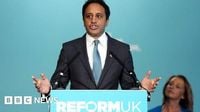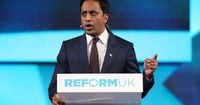Zia Yusuf, the chairman of Reform UK, resigned on Thursday, June 5, 2025, marking a significant setback for the party and its leader Nigel Farage. Yusuf announced his departure in a post on the social media platform X, stating that he no longer believed working to get a Reform government elected was a "good use of my time." His resignation followed a contentious episode involving the party's newest MP, Sarah Pochin, who had asked Prime Minister Sir Keir Starmer during Prime Minister's Questions whether the burka would be banned "in the interests of public safety." Yusuf described Pochin's question as "dumb," sparking internal debate and public scrutiny.
Yusuf took on the role of chairman shortly after the 2024 general election, dedicating himself full-time as a volunteer to rapidly transform Reform UK. In his 11 months at the helm, he helped increase the party's national polling from 14% to 30%, quadrupled its membership, and led the party to historic electoral successes. Under his guidance, Reform UK secured five MPs in the general election and went on to win a by-election, two mayoral races, and gained 677 new councillors by May 2025.
Before entering politics, Yusuf was a successful banker and tech entrepreneur, having sold his start-up company for over £200 million. He also donated £200,000 to Reform UK during the 2024 general election campaign. Proudly identifying as a British Muslim patriot, Yusuf was credited with professionalising the party's operations, implementing corporate-style management, and spearheading initiatives such as the "Doge" unit—a nod to Elon Musk's Department of Government Efficiency—aimed at cutting wasteful spending in councils controlled by Reform.
However, Yusuf's tenure was not without controversy. His blunt management style, described by party leader Nigel Farage as having a "Goldman Sachs-type mentality," reportedly caused friction within the party ranks. Farage noted that while Yusuf excelled in data and technical matters, his interpersonal skills were less polished. "Were his interpersonal skills at the top of his list of attributes? No. But I always found him, with me, very polite," Farage said.
The resignation came as a surprise to many, with Farage revealing he had only a "10-minute warning" before Yusuf stepped down. Farage expressed genuine regret over losing a key figure in Reform's rise, calling Yusuf "an enormously talented person" and a "huge factor" in the party's success on May 1, 2025. Yet he also acknowledged the pressures of political life, suggesting Yusuf had "had enough" of the relentless nature of politics, compounded by hostile online abuse, including targeting from "Indian bots" and alt-right trolls on X.
The burka question posed by Sarah Pochin during her Commons debut on June 4, 2025, became a flashpoint. Pochin asked if the burka would be banned, citing public safety concerns, a stance not officially adopted by Reform UK. Yusuf publicly criticized the question, stating it was "dumb for a party to ask the PM if they would do something the party itself wouldn't do." The party’s deputy leader, Richard Tice, called for a "national debate" on the issue but declined to state his personal position.
Pochin responded to Yusuf's resignation by praising him as "a great friend and colleague," and acknowledged the lasting legacy of his professionalisation efforts within Reform UK. Nonetheless, the incident exposed underlying tensions within the party as it grapples with balancing populist messaging and coherent policy positions.
Adding to the internal strife, former Reform MP Rupert Lowe remains a contentious figure. Lowe was expelled earlier in 2025 following allegations of harassment and threats of physical violence against Yusuf, which were reported to the police. While the Crown Prosecution Service later decided not to bring charges against Lowe, the episode deepened divisions. Farage emphatically stated he would "rather eat razor blades" than reinstate Lowe, underscoring ongoing factional disputes.
Yusuf's departure also led to the exit of Nathaniel Fried, the tech entrepreneur appointed to lead the "Doge" unit. Fried expressed respect for the councils’ efforts to save taxpayer money but felt it appropriate to leave alongside Yusuf, leaving Reform's ambitious plans to slash local government waste in disarray.
Political rivals seized on the turmoil within Reform UK. A Labour Party spokesperson criticized Nigel Farage’s leadership, saying, "If Nigel Farage can't manage a handful of politicians, how on earth could he run a country? He has fallen out with everyone he has ever worked with. Reform are just not serious." Liberal Democrat deputy leader Daisy Cooper quipped, "By sacking himself, Zia Yusuf seems to be leading the ‘UK Doge’ by example. You have to admire his commitment to the cause. It's already clear Reform UK cannot deliver for the communities they are elected to stand up for. Instead, they have copied the Conservative playbook of fighting like rats in a sack." Conservative leader Kemi Badenoch dismissed Reform as "not a political party. It is a fan club."
Despite these challenges, Reform UK has continued to push bold fiscal policies. Earlier on the day of Yusuf's resignation, Deputy Leader Richard Tice confirmed the party's readiness to cut government spending to about 35% of national income, amounting to nearly £300 billion. Yusuf himself had advocated for slashing the state by £300 billion to £400 billion, aiming to return spending ratios to levels seen in the mid-1990s. Critics warned these proposals risked triggering economic crises and devastating public services, with Labour's Dan Tomlinson warning, "Reform’s fantasy economics would lead to a financial crisis whilst devastating public services."
Arron Banks, a prominent Brexit donor and Reform mayoral candidate, was tipped as a potential successor to Yusuf as chairman. Banks acknowledged Yusuf's hard work but noted his struggles with interpersonal relationships, suggesting internal party dynamics would continue to be complex.
Yusuf's resignation comes at a pivotal moment for Reform UK, which is attempting to consolidate its gains and expand influence, including in Scotland where it competes against the Scottish National Party and Labour. Farage had recently highlighted Yusuf's background as an example of the party's diversity, emphasizing a rejection of racial segmentation.
Ultimately, Yusuf's exit underscores the difficulties Reform UK faces as it tries to professionalise and manage internal divisions while navigating the pressures of rapid political growth. His departure leaves a void in the party's leadership and raises questions about its future direction and stability.






